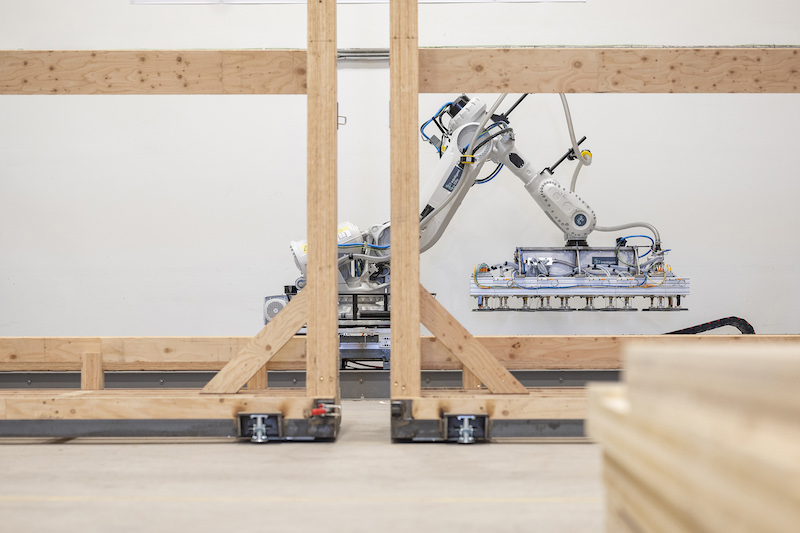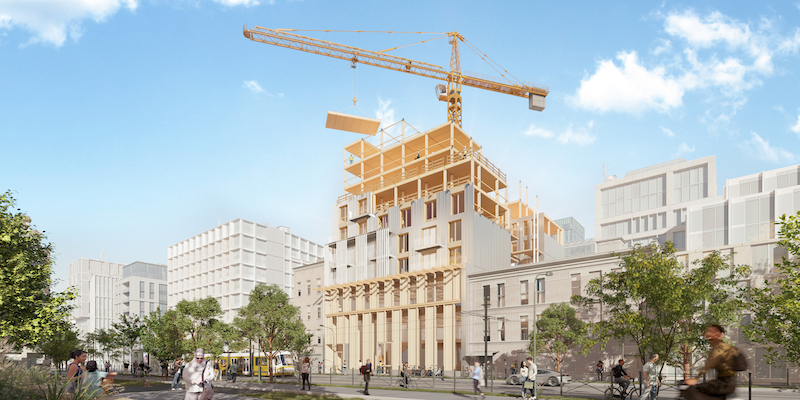Intelligent City raises $30 million to bring robotics and automation to prefabricated construction sector
With pressure mounting for cities to address affordable housing needs, decarbonize buildings, and meet sustainability goals, housing technology company Intelligent City raised CAD 22 million ($17 million), bringing the total capital invested in the company to CAD 30 million ($23 million).
As one of the first companies in North America to apply automation and robotics to the design and manufacturing of prefabricated mass timber buildings, Intelligent City will use the funding to scale operations, commercialize its Platforms for Life (P4L) building solution, grow factory automation, and expand its footprint across and beyond Canada.
Earlier this year, the company completed testing of its building systems and is now verified to work within the new mass timber high-rise building codes in Canada and the US.
The raise includes Series A venture funding with participation by BDC Capital’s Cleantech Practice, Greensoil PropTech Ventures, UIT Growth Equity GP, Fulmer & Company, and over 30 independent investors, in combination with government programs and accelerators such as the Natural Resources Canada (NRCan) Investments in Forest Industry Transformation program (IFIT), the Sustainable Development Technology Canada (SDTC) Seed Fund, and the Next Generation Manufacturing Supercluster (NGen) Manufacturing Project Funding. Fort Capital Partners acted as financial advisor and placement agent for the Series A and Seed rounds.
Oliver Lang, CEO and co-founder of Intelligent City, says: “We are focused on revolutionizing an industry that is notoriously slow to innovate while making a significant impact on our climate with lower carbon emissions from the construction and operations of buildings.

“By utilizing green building strategies and patented technology to deliver affordable, mass-customizable urban housing, we can help cities to adapt more quickly as the needs of people and the planet evolve.”
By developing a flexible yet scalable technology and design platform, the company departs strongly from the construction industry’s typically fragmented and hierarchical design and construction processes.
Focusing on a deep vertical integration of building systems, software, manufacturing automation, and supply chain contracts, the company can help developers achieve nearly 100 percent cost certainty, deliver 1.5 times the number of residential units on the same site compared to traditional methods, and realize savings of up to 50 percent on life cycle costs per home.
Matt Stanley, director, BDC Capital’s Cleantech Practice, says: “Intelligent City’s technology is set to enable the future of the built world to be more climate-resilient by replacing emissions-intensive materials such as concrete and steel with a renewable material that naturally sequesters carbon.
“We are excited to support the team to accelerate the development and scale-up of its mass timber building system and advanced offsite manufacturing capabilities.”
Intelligent City’s end-to-end, product-based approach uses proprietary parametric software for design, construction cost estimation, carbon footprint confirmation, material quantifications, and precision manufacturing.

At the same time, the company’s innovative manufacturing technology brings automation to the prefabrication of building components. As a result, the company provides data on the life cycle and performance of the building before construction even begins.
Dana Goldman Szekely, senior principal with Greensoil PropTech Ventures, says: “As PropTech industry disruptors, we were excited by the combination of Intelligent City’s platform technology with prefabricated and modular mass timber products to radically speed up construction and dramatically reduce carbon emissions.”
At the same time, Jamie James, managing partner at Greensoil PropTech Ventures, will join the board of directors of the company.
In combination with mass timber construction, Intelligent City utilizes the energy-efficiency standards of Passive House design to achieve a 90 percent carbon emissions reduction in its buildings. This concept uses building science principles to attain specific energy efficiency and comfort levels.
It includes continuous insulation and air-tight seals, high-performing windows and doors, balanced heat- and moisture-recovery ventilation, and minimal space conditioning throughout the entire building.
Patrick Robinson, chairman of UIT, says: “ESG technologies are not only imperative but demanded by building operators, owners, and tenants. Our investment in Intelligent City resulted from careful consideration of the future landscape of the construction industry as well as the vision and the passion demonstrated by the entire team at Intelligent City.”
With a pipeline of more than 2,300 homes, Intelligent City is supported by leading developers in Vancouver, Toronto, Ottawa, and the United States, including two high-rise projects in Downtown Vancouver, one of which is supported by the BC Mass Timber Demonstration Program.
The company was previously granted funding by the CleanBC Building Innovation Fund, the National Research Council of Canada’s Industrial Research Assistance Program (NRC IRAP), and Natural Resources Canada’s Breakthrough Energy Solutions Canada program (BESC). The technology platform has also been awarded the Solar Impulse Efficient Solution Label.
Yuri Fulmer, founder, and chairman of Fulmer & Company, says: “Affordable, efficient, and attractive housing is lacking globally. As cities and developers scramble to construct more buildings on pre-existing urban lots, Intelligent City developed a fundamentally better and faster way to erect buildings that are more energy-efficient and cost-effective.”
Jonathan Wilkinson, Canada’s Minister of Natural Resources, says: “By making effective use of Canada’s forest resources through low-carbon building systems, Canada is becoming a world leader in sustainable wood construction practices, increasing energy efficiency and climate resilience in our communities while simultaneously enhancing the global competitiveness of our forestry, wood manufacturing and construction sectors.
“That’s why our government is pleased to support projects like this one — to help lower emissions, create good jobs for workers and build better neighborhoods for everyone.”

